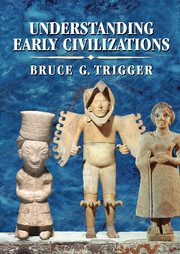Book contents
- Frontmatter
- Contents
- List of Illustrations
- Preface
- Understanding early civilizations
- Introduction
- Sociopolitical organization
- 5 Kingship
- 6 States : City and Territorial
- 7 Urbanism
- 8 Class Systems and Social Mobility
- 9 Family Organization and Gender Roles
- 10 Administration
- 11 Law
- 12 Military Organization
- 13 Sociopolitical Constants and Variables
- Economy
- Cognitive and symbolic aspects
- Discussion
- References
- Index
5 - Kingship
Published online by Cambridge University Press: 05 June 2014
- Frontmatter
- Contents
- List of Illustrations
- Preface
- Understanding early civilizations
- Introduction
- Sociopolitical organization
- 5 Kingship
- 6 States : City and Territorial
- 7 Urbanism
- 8 Class Systems and Social Mobility
- 9 Family Organization and Gender Roles
- 10 Administration
- 11 Law
- 12 Military Organization
- 13 Sociopolitical Constants and Variables
- Economy
- Cognitive and symbolic aspects
- Discussion
- References
- Index
Summary
All the early civilizations compared in this study had kings. In modern political terminology this signifies that sovereignty, or supreme authority, was symbolically embodied in an individual person rather than in some collectivity of people such as all adults, all males, all property owners, or all nobles or some abstract concept such as God or Jean-Jacques Rousseau's General Will (Kamenka 1989: 7).
The terms used to designate kings had different meanings and connotations in the different civilizations. The Aztec word that is glossed as ‘king’ was tlatoani (plural tlatoque), which in Nahuatl meant ‘great/revered speaker’. The Aztec and their Nahuatl-speaking neighbours applied this term to all hereditary heads of states, but they conceptualized political leadership in a dyadic fashion. The tlatoani shared sovereignty with the cihuacoatl, a hereditary official appointed from a junior branch of the royal family who could not become king. The cihuacoatl oversaw the courts and palace administration and when necessary acted as regent. Although his title meant ‘snake woman’, like the tlatoani the holder of this office was always a male. In Aztec thought, the tlatoani and cihuacoatl together symbolized lordship, just as the supreme deity Ometeotl, Lord and Lady of Twoness, was a dual entity that constituted the totality of existence. In practice, however, the Aztec tlatoani was a supreme ruler.
- Type
- Chapter
- Information
- Understanding Early CivilizationsA Comparative Study, pp. 71 - 91Publisher: Cambridge University PressPrint publication year: 2003



